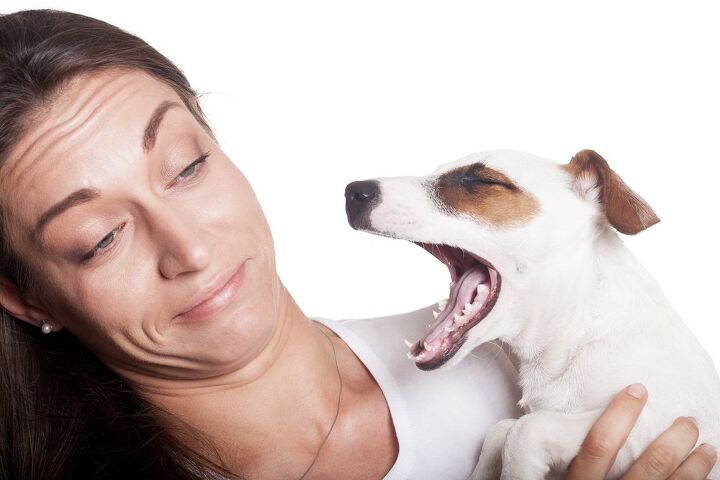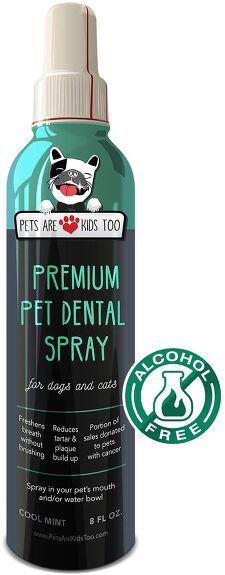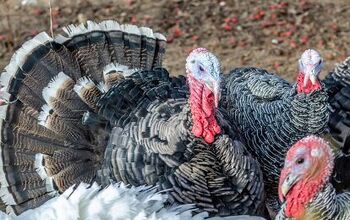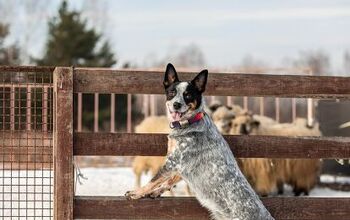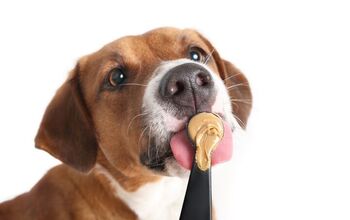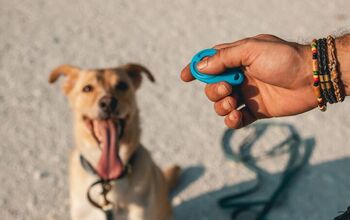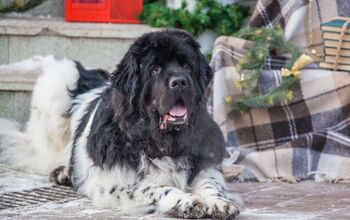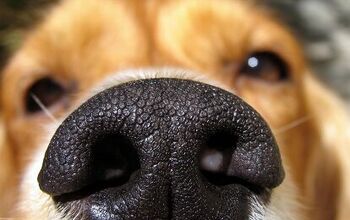Best Dog Breath Sprays

Dog breath sprays make sure that your dog’s breath doesn’t smell – no matter what is causing it. The trick is knowing how to choose the right type of pet breath freshener, so read on to learn more – and find the best option for your stinky furball.
Pooch smooches might be the cutest, but they sure don’t smell like roses! But a little bit of dog breath never killed anybody, so you put up with it to enjoy some quality cuddling with your four-legged besties. But what about when your dog’s breath is really stinky? Not only that it can be very unpleasant to live with, but it can also signify an underlying health issue. Bad breath in dogs can be caused by a number of things, from poor diet to compromised dental health and it’s important both to pinpoint what’s making your dog’s breath smell and to find a way to treat it. The best way to immediately neutralize odor in your dog’s breath is to use dog breath sprays. Of course, they are just a way to mask the unpleasant stinkiness, but won’t prevent it or treat the cause behind it. It’s essential to keep oral hygiene up to standards if you want to really reduce your pet’s bad breath to a bare minimum – or completely eliminate it.
So, to work the way they are intended to and for their effects to be long-lasting, it’s best if dog breath sprays are combined with regular teeth brushing and if needed, routine dental cleanings. You can even throw in a few dental treats, too, because they also help improve oral hygiene and breath odor. The way dog breath sprays work is to use dog-friendly substances that have odor-neutralizing properties to remove stinkiness and deodorize your pet’s breath instantly after they are used. They are often flavored to entice dogs into cooperation, so they’ll look forward to the mist being sprayed in their mouth instead of being suspicious of it. Some dog breath sprays are formulated just to give your pet’s breath a more pleasant scent, while others contain ingredients that support oral health, reduce bacteria, and make sure that plaque build-up is kept under control.
So, how do you know which dog breath sprays will actually work for your pet’s foul-smelling breath? First, you have to eliminate an underlying health issue if there’s one. If your dog has bad digestion or periodontal disease, a breath freshener will just mask some of the smell but won’t completely eliminate it. It’s crucial to treat the problem first (or simultaneously) to get the most out of dog breath sprays, and, of course, to maintain good dental hygiene. With that in mind, there are some features and ingredients to look out for if you want to ensure that dog breath sprays work as intended. To help you find effective breath fresheners for dogs, we’ve done the research for you- and rounded up the best dog breath sprays on the market. No matter how stinky your furry bestie is, these pet breath fresheners will make sure their smooches are odor-free.
1. Editor’s Choice: Bodhi Dog Natural Dog Breath Freshener for Dogs
Odor, begone – this all-natural dog breath freshener spray will keep your pet’s breath minty fresh at all times. Relying on natural ingredients to remedy bad breath in dogs, this spray contains a blend of baking soda, honey, cloves and spearmint which together neutralize the buildup on teeth and across the tongue, helping your pet finally get rid of smelly breath. Made in the USA, alcohol-free, and safe to use on dogs of all breeds and sizes over 12 weeks of age, this breath spray for dogs has a sweet taste so your pooch won’t mind their new oral hygiene regime – not for one bit! It’s also super simple to apply, even if your dog is finicky: simply spritz this solution into your pet’s mouth once a day and that’s it.
2. Runner Up: Pets Are Kids Too Premium Pet Dental Spray
When combined with a regular teeth cleaning routine, this breath-freshening spray for dogs will make sure your dog’s teeth are tartar-free and their breath odorless! The combination of baking soda, aloe vera, spearmint, peppermint, and other dog-safe ingredients successfully masks unpleasant smells while working to target the root of the odor too: plaque build-up. For best results, spray a bit in your dog’s water bowl and some along their gums for immediate breath-deodorizing action. To boot, this dental spray is very cost-effective as it comes in a big 8 oz bottle, so it’s great if you want to save money or have more than one (stinky) pooch in your family. And it’s super easy to use, as well: simply add 3 to 5 sprays into your pet’s water bowl and 2 to 3 sprays along their gums and teeth on both sides to banish bad breath once and for all!
3. Best 2-in-1: Mighty Petz 2-in-1 Dog Breath Freshener Spray & Water Additive
With only 8 ingredients, this clean, natural formula helps neutralize bad breath in dogs without using any harmful or artificial ingredients in the process. Made in the USA with certified organic ingredients such as thyme, parsley, and peppermint, this spray works on an enzymatic level to target the cause of bad breath and actually eliminate it and not just mask the odor. Natural thyme properties, as well as green pigments found in parsley and peppermint it helps with gums irritation and plaque buildup on teeth, and leaves a minty fresh scent behind. This spray contains no alcohol, xylitol, stevia, and no artificial sweeteners, flavors, or colors. It can be used by spraying directly in the pet’s mouth or added to water as an additive – you’ll get the best results if you combine the two.
4. Customer’s Choice: Nylabone Advanced Oral Care Spray
Nylabone offers a whole range of products that support canine dental health- from specially designed chew toys to dog toothpastes, their oral hygiene products are popular with good reason. This dog breath spray doesn’t disappoint, either, with its unique formula that promotes a healthy, fresh-smelling mouth effortlessly. The secret is in the proprietary Denta-C ingredient that has scientifically been proven to reduce plaque that harbors bacteria, and in turn, eliminate the main cause of bad breath in dogs.
5. Best Natural: PetzLife Peppermint Oral Care Spray
Completely natural yet surprisingly effective in fighting stinky dog breath, this breath freshener calms inflamed gums, controls dangerous pathogens in the mouth, prevents plaque build-up, and gives your pooch a nice minty breath. The formula combines potent natural remedies such as thyme oil, neem oil, peppermint oil as well as grape seed and grapefruit seed extracts to offer complete oral care. The best part is that this natural formula is safe for cats and dogs both, so if you live in a multi-pet household, this dental spray is quite cost-effective.
6. Best Flavors: TropiClean Fresh Breath Spray
With this dog dental spray, you don’t have to be limited to one scent alone- you can pick and choose the smell of your pupper’s breath. The available aromas are berry, peanut butter, vanilla mint and original (mint), and it’s not just the scent that they offer, but flavor as well. So if your pet doesn’t seem to enjoy spritzes of minty breath fresheners, this one is a good alternative- if they taste the PB in that mist, they’ll be asking for seconds! Just spray one pump in your pet’s mouth or on your hand and let them lick it off and you’ll immediately notice the difference.
7. Best Baking Soda: Arm and Hammer Advanced Care Dental Spray
No matter how ripe your dog’s breath smells, this baking soda infused dental spray can help neutralize the odor. This is also a great option for pet owners who don’t want to use essential oils in their pet’s oral care (as most natural dog breath sprays contain them) since the main active ingredient is baking soda, enhanced with other plaque-fighting substances. The flavor and the scent are mint, so this dental spray also deodorizes breath immediately. Apply by lifting your pet’s lips and spray 1 to 2 pumps directly onto teeth and gums – and if you really want the best effects, don’t let your pet eat or drink for one hour after application to let the spray do its magic.
8. Best Gentle: Warren London Doggy Dental Dog Breath Freshener Spray & Pet Water Additive
Made in the USA with natural ingredients such as peppermint, cinnamon, natural honey, cloves, and aloe vera, this gentle but efficient breath-freshening spray for dogs will greatly improve your dog’s oral hygiene. In addition to making your pet’s breath odor-free, this solution loosens plaque and tartar buildup on teeth, targeting the actual cause of your pet’s bad breath in the first place. It can be used as a spray (spritz 2 to 3 times along gums and teeth on each side) or as a water additive ( 4 to 6 sprays daily into the water bowl). Of course, if you really want stellar results, use it as both!
9. Best Immune Booster: TruDog Spray Me Dog Dental Spray
This four in one dental dog spray offers multiple benefits: it prevents plaque and tartar buildup, boosts their immune system inside, and controls the bacteria that cause bad breath and instantly deodorizes bad breath. Made in the USA with essential oils, this proprietary natural formula can help even dogs who have tartar build-up with regular use- just be sure to combine it with regular brushing for best effects.
10. Best Budget: Well & Good Dog Breath Spray
If you’re on a tight budget but don’t want to compromise on quality, this affordable dog breath spray is the perfect solution. Infused by baking soda, this dental stray is quite effective when it comes to neutralizing odors, and will make sure that plaque finds it more difficult to stick to your pet’s teeth. Having in mind its 4 oz size, effectiveness, and a budget-friendly price tag, this dog dental spray is hard not to love. And, rinsing is not necessary, either – could it get any better than this?
Reasons for bad breath in dogs
In most cases, your pet’s bad breath is just a direct result of neglected dental hygiene: if you don’t brush your pet’s teeth regularly or properly, his morning breath will definitely leave something to be desired. The reason for this is that poor hygiene allows bacteria to flourish inside your pet’s mouth, and the telltale sign of bacterial overgrowth is odor. Not only that stinky breath caused by bacteria in the mouth is unpleasant, but this could lead to other, more serious dental issues. To prevent this, be sure to use a pet teeth brush and dog toothpaste to thoroughly clean your pet’s sparkly whites, at least every other day – if not on a daily basis. The goal is to remove tartar buildup, massage gums, and keep breath fresh-smelling by regularly cleaning the teeth and massaging the gums simultaneously. This is achieved by angling the brush 45-degrees and brushing in a circular motion, for at least 90 seconds.
We’ve already mentioned that bad breath doesn’t have to be just a product of poor hygiene. Sometimes, either bad hygiene or other issues cause health problems whose symptoms are bad breath. Here are some of the most common reasons for bad breath in dogs – other than the lack of teeth brushing:
Periodontal disease
If you neglect your pet’s oral health, it’s almost certain that poor hygiene will lead to periodontal disease. Overgrowth of bacteria and tartar build-up cause gum tissue inflammation, cavities, bad breath, tooth loss, and an array of painful and potentially debilitating issues. This is especially true for dogs with crowded teeth, small breed dogs, and those pooches who haven’t been brushing regularly. Professional dental cleaning is recommended in cases where plaque buildup is significant, to prevent further damage.
Diabetes Mellitus
Not many pet owners know that foul-smelling breath in dogs can signify their four-legged companion has diabetes. If your pet’s bad breath has a sweet or fruity scent to it, it means you should visit the vet, as it can mean that your pet has diabetes mellitus. This is particularly concerning if your dog displays some other symptoms such as increased thirst and more frequent peeing. Fortunately, with timely reaction and proper treatment, diabetes in dogs is completely manageable- so don’t wait if you have any concerns.
Kidney disease
If your pet’s breath reeks of urine, licking other dog’s pee is likely not the cause of it- it’s their kidneys you need to worry about. The telltale sign of kidney disease or kidney infection is a breath that smells like pee, along with a few other symptoms that vary from condition to condition. In case you have reason to believe that your pet has kidney disease, contact your vet immediately as this could be a serious condition with severe consequences if not treated on time.
Liver disease
Abnormally stinky breath paired with symptoms such as vomiting and yellowish sclera is a warning sign: your pet is likely having problems with his liver. Your pet might also exhibit loss of appetite and lethargy, as well. Needless to say, liver disease is no joke and immediate veterinary care is required if you suspect your pet has it.
Gastrointestinal issues
A lot of the time, the origin of the stench is not in the mouth itself, but comes from within: dog’s bad breath can be caused by issues in his gastrointestinal tract. Acid reflux, megaesophagus, or persistent vomiting due to a sensitive stomach are all bound to cause an unpleasant smell of your dog’s breath. Depending on the issue, you might want to look into changing your pet’s diet or using medication to keep odor at bay, along with other symptoms of the condition.
Infection of the respiratory tract
Did your pet have a really bad sinus infection recently? Or do they have nasal tumors? It might be what’s causing their rancid breath stench. These conditions can cause the forming of the pus in the nasal cavity, which then trickles back down the throat, resulting in stinky breath. The treatment varies depending on the disease, but the bad breath should clear up when the underlying issue is resolved.
Nasty habits
You are what you eat- and for dogs, this doesn’t bode well. More often than not, dogs can be completely disgusting when it comes to what they put in their mouth: other dog’s poop, cat poop, carrion, and trash- it’s all fair game for some pooches. Sometimes, there’s no reason for medical concern when your pet’s breath suddenly turns vile: it might just be some (literal) crap they put in their mouth during the walk or when you weren’t looking.
What to look for in dog breath sprays
Regardless of what causes your pet’s foul breath, you’ll have to use different products to reduce or completely eliminate it. In addition to deodorizing toothpaste, breath-freshening chew treats or toys, dog breath sprays are the most effective tool for smelly smooches. However, not all breath fresheners are equally effective- what works for some pets might not be as good for others. To make sure you’re making the right choice, here are the things you need to consider before purchase:
Is it safe for my dog?
Your primary concern when buying anything for your pet should be their safety. This is especially true when talking about products that can or will be ingested, such as dog breath sprays. Be sure that the breath freshener you pick is made from dog-safe ingredients, and double-check for allergens if your pet has any known sensitivities.
Is it flavored?
While the flavor isn’t a must for dog breath fresheners (it’s the smell that’s important to pawrents), it can definitely make things easier. If the dog breath spray has a yummy taste, such as beef or poultry, your dog will be more enthusiastic about it- and it will be so much easier to administer the spray.
Are there any additional effects besides odor-neutralization?
Some dog breath sprays are multifunctional: in addition to deodorizing your dog’s stinky breath, they can contain antibacterial or soothing ingredients that work to promote better oral health and prevent dental disease. If a potential price tag difference is not an issue for you, then always opt for the breath fresheners with added perks and benefits: more is more in this case!
How do you use dental spray on dogs?
Using dental sprays is easy, which is one of many reasons why pet owners like them so much. Just gently lift your pet’s mouth to spray along the gums and teeth, on both sides, and you’re done for the day! Each formula is different, however, so the amount of spritzes can vary with each brand – be sure to check the label for exact instructions for each particular dental spray.
How do you get rid of severe tartar on dogs teeth?
The best and most efficient way to get rid of tartar buildup on dog’s teeth is by daily brushing and use of oral hygiene aids such as dental chews, dental sprays, or water additives. However, when it gets to a stage that the tartar buildup is severe, there’s no other solution than taking them to a vet for a professional dental cleaning. Your veterinarian will completely remove the nasty, bacteria-ridden brown layers of plaque and tartar after lightly sedating your pet, either with a hand dental scaler or an ultrasonic one, and often by combining the two for best results. After the tartar is removed, the teeth will be polished to remove any remaining scrapes and imperfections and reduce the chance of future build up – but you’ll have to put in the work, too, to make sure tartar doesn’t get severe again with a proper oral hygiene routine.
What causes dogs to have tartar?
Tartar is simply a film of bacteria over your pet’s teeth that’s been hardened into calcified deposits after a period of time. This occurs when saliva, bacteria, and food particles come into contact and stay on your pet’s teeth (because they haven’t been brushed), over and over again. Tartar buildup can not only cause inflamed gums, cavities, but also periodontal disease, dental abscesses, and even complete teeth loss, so make sure that you brush your pet’s teeth regularly to prevent buildup from occurring and affecting your pet’s health.
Additional resources:
We are committed to finding, researching, and recommending the best products. We earn commissions from purchases you make using the retail links in our product reviews. Learn more about how this works.

A proud mama to seven dogs and ten cats, Angela spends her days writing for her fellow pet parents and pampering her furballs, all of whom are rescues. When she's not gushing over her adorable cats or playing with her dogs, she can be found curled up with a good fantasy book.
More by Angela Vuckovic



